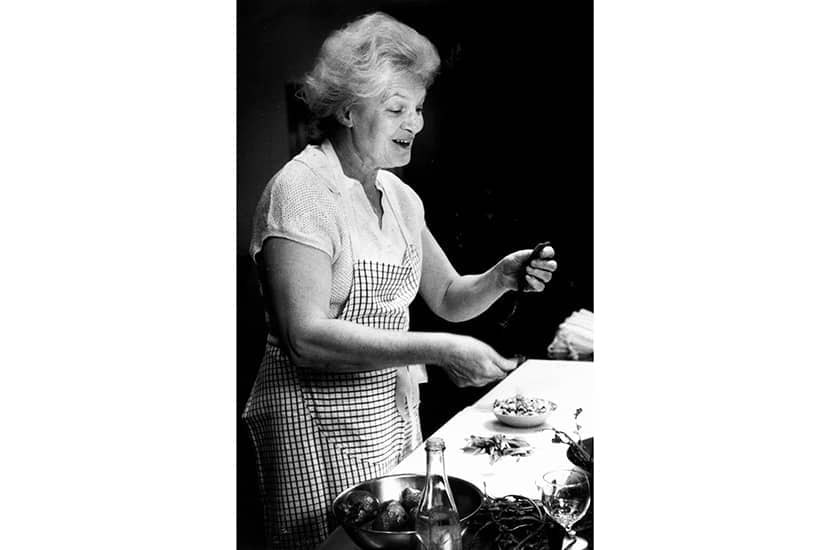What is ‘immigrant food’? In America, the answer can be just about anything — from burritos to bibimbap to burgers. In a country shaped by immigrants, there is little else but immigrant food. But while some food cultures are firmly embedded in the American mainstream, well-mixed into the fabled ‘melting pot’, others are not. This is ever-changing: a few decades ago the ubiquity of sushi, for example, would have been unthink-able. Is this a good thing? It depends who you ask. Assimilation can bring belonging, but also compromise.
Greater knowledge and appreciation of different food cultures doesn’t just happen. People make it happen. Mayukh Sen’s Taste Makers examines the lives of seven immigrant women, all from different backgrounds, who contributed to the way America cooks and eats: Chao Yang Buwei from China, Elena Zelayeta from Mexico, Madeleine Kamman from France, Marcella Hazan from Italy, Julie Sahni from India, Najmieh Batmanglij from Iran and Norma Shirley from Jamaica.
Immigrant status, gender and an interest in food unite these cooks. But their stories, careers and goals are hugely diverse. Each chapter offers a detailed portrait of one woman. Take Chao Yang Buwei, who brought ‘stir-fry’ into the lexicon with her seminal 1945 book How to Cook and Eat in Chinese at a time when, as Sen puts it, ‘chop suey, a Chinese-American innovation, held tyrannical sway over the American imagination’. Sen considers Buwei’s food carefully and the space she made for less familiar Chinese dishes from regions other than Guangzhou, including Jiangnan’s pea starch noodles and Nanking’s cold saltwater duck.
An examination of food and identity is nothing new, nor is a focus on immigrant food culture in America. Indeed the variety and pervasiveness of food from different countries is often used as a metonym for America’s multiculturalism. But Sen’s approach is different. He avoids quoting family members and acolytes, and therefore hagiography. Instead, he paints a vivid, complex picture of his subjects.
His portrait of Zelayeta acknowledges that her desire to assimilate and persuade meant that
to engage reluctant readers, Elena made her turkey in green mole sauce purposefully mild; she said ‘good old American hot dogs’ worked just fine in lentil soup if cooks couldn’t find the Spanish longaniza sausage that was beloved in Mexican cooking.
This forgiving approach to her readers’ attitude to foreign ingredients, Sen observes, may account for Zelayeta’s writing’s lack of longevity. But to her accommodation didn’t mean compromise; it was part of her culinary identity. ‘I love being an American,’ she said.
Taste Makers doesn’t shy away from some of the problems that surround immigrant food: of translation (Buwei, for instance, spoke little English); of media focus (Zelayeta went blind at 36, a fact that has dominated most writing about her); of the balance between authenticity and accessibility. As a result, it embraces the wider subject of the immigrant experience in America:
I wanted to tell the story of immigration… through the prism of food, but that’s not quite what this book ended up being. I found myself interrogating the very notion of what success looks like for immigrants under American capitalism.
Success is inherently subjective. These women fundamentally changed the American approach to Iranian, Jamaican and Chinese food, but their legacies are incomplete. Most of them, despite enjoying critical and commercial acclaim in the lifetimes, have not been remembered (the exception is Hazan, who remains a figurehead of Italian cooking after her death) and their stories have gone untold for decades. Sen attempts to right this, but also to raise wider questions about culinary acceptance and legacy.
He contrasts one other woman with his subjects: Julia Child. The American who lived as an expat in France wrote about French food for an American readership and enjoyed stratospheric success (not shared by her French co-authors). Sen calls her a ‘reverse immigrant’ and, while acknowledging her well-known eccentricities, observes that they ‘can obscure a very fundamental privilege she carried: Julia Child was American’. Her story feels incongruous set among the others’ — but that is the point. As Sen writes: ‘She carried no threat of the outsider. Her American origins were a crucial component of why viewers listened to her.’
Sen is an excellent storyteller, and his portraits are immersive. Taste Makers is a well-researched book that shines light on seven women who helped to change culinary tastes in America. But at times it is an uncomfortable read. Grouping them together raises more questions than it answers, and forces the reader to look at whose stories we value and why.







Comments